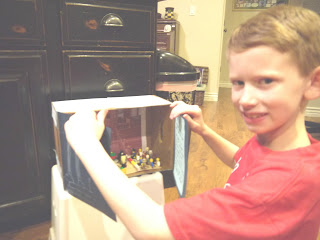My fourth grade son, Carter was assigned to read a fiction book for a book report. I like to "gently persuade" him away from Captain Underpants and try some new books out that might teach him something new. So we tried out Theodore Boone Kid Lawyer by John Grisham.
 |
The website is pretty cool too with visuals and opportunities to explore the courtroom.
We read it together and he learned a lot! The vocabulary alone taught him all sorts of new information. Some of it was over his fourth grade head like illegal immigration laws, but overall...an interesting children's book. From my perspective, Grisham could use a little more skill with connecting with the child audience but did an okay job at bringing the law to a "lower" level.
Here is the book box Carter created to share with his class. It was a courtroom with lego's. The box was covered in some of the new vocabulary with definitions that he typed up. I've added it below.
Law Vocabulary
(Legal Jargon)
defense: the lawyer trying to convince not guilty
prosecutor: the lawyer trying to convince guilty
jurors: 12 people from town chosen to listen to the case and decide guilty or not guilty
defendant: the person on trial
verdict: guilty or not guilty
at rest: when both lawyers are done giving their side of the story
cross-examine: when the other lawyer asks questions to the witness
witness: people called to sit up on the stand by the judge and tell their side of the story
evidence: a crucial thing or object used to convince guilty
DNA: a type of evidence used sometimes in cases from body/hair particles
mistrial: when a judge decides to postpone a case for some reason
illegal immigrant: a person living or working in our country without a passport, visa or the right papers.
courthouse: the place that holds offices for the judges and the different courts like animal court, criminal court, family court, probate (wills) court, and others.
paralegal: an assistant to lawyer
stenographer: the person who types every word said in court for the court record which is private to the public.
gavel: the hammer looking thing a judge holds
overruled: what judges say to stop an argument between lawyers
contempt: when someone gets in trouble and might have to be placed in jail by the judge for disrupting or bothering the judge or the case.
circumstantial: when there is no exact evidence or witness but it seems like the person might be guilty
presumed innocent: everyone is supposed to be thought of as innocent until the lawyer proves them guilty with facts, evidence and witnesses.
surprise witness: a last minute person who saw something or knows something and is introduced into the case surprising the jurors
proof: a piece of evidence that shows for sure that someone is guilty or not.
presumed: to make an opinion before hand without hearing all the arguments fairly.
plead: the official way the defendant feels. He can plead that he is innocent and didn’t do it or guilty and go on to get his punishment from the judge.
bench: the chair and table where the judge sits.
allegedly: that someone might have done something but it’s not proven yet, like a rumor.
confidentiality: anything a person says to a lawyer can’t be repeated and is totally private and confidential
“to walk”: when a guilty person is ruled not guilty and gets to go free even though he did it.
opening statements: the summary at the start of a trial given by the lawyers to show what they plan on proving
bailiff: the person who guards the prisoner and also says, “The court is now in session”































































































